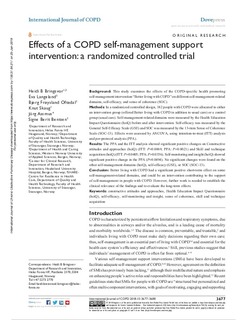Effects of a COPD self-management support intervention: a randomized controlled trial
Bringsvor, Heidi Breistrand; Langeland, Eva; Oftedal, Bjørg Frøysland; Skaug, Knut; Assmus, Jörg; Bentsen, Signe Berit
Journal article, Peer reviewed
Published version
Permanent lenke
http://hdl.handle.net/11250/2583510Utgivelsesdato
2018Metadata
Vis full innførselSamlinger
- Import fra CRIStin [3580]
- Institutt for helse- og omsorgsvitskap [2721]
Originalversjon
Bringsvor, H. B., Langeland, E., Oftedal, B. F., Skaug, K., Assmus, J. & Bentsen, S. B. (2018). Effects of a COPD self-management support intervention: a randomized controlled trial. International Journal of Chronic Obstructive Pulmonary Disease, Volume 13, 3677-3688. 10.2147/COPD.S181005Sammendrag
Background: This study examines the effects of the COPD-specific health promoting self-management intervention “Better living with COPD” on different self-management-related domains, self-efficacy, and sense of coherence (SOC).
Methods: In a randomized controlled design, 182 people with COPD were allocated to either an intervention group (offered Better living with COPD in addition to usual care) or a control group (usual care). Self-management-related domains were measured by the Health Education Impact Questionnaire (heiQ) before and after intervention. Self-efficacy was measured by the General Self-Efficacy Scale (GSE) and SOC was measured by the 13-item Sense of Coherence Scale (SOC-13). Effects were assessed by ANCOVA, using intention-to-treat (ITT) analysis and per-protocol analysis (PPA).
Results: The PPA and the ITT analysis showed significant positive changes on Constructive attitudes and approaches (heiQ) (ITT: P=0.0069; PPA: P=0.0021) and Skill and technique acquisition (heiQ) (ITT: P=0.0405; PPA: P=0.0356). Self-monitoring and insight (heiQ) showed significant positive change in the PPA (P=0.0494). No significant changes were found on the other self-management domains (heiQ), self-efficacy (GSE), or SOC (SOC-13).
Conclusion: Better living with COPD had a significant positive short-term effect on some self-management-related domains, and could be an intervention contributing to the support of self-management in people with COPD. However, further work is needed to establish the clinical relevance of the findings and to evaluate the long-term effects.

